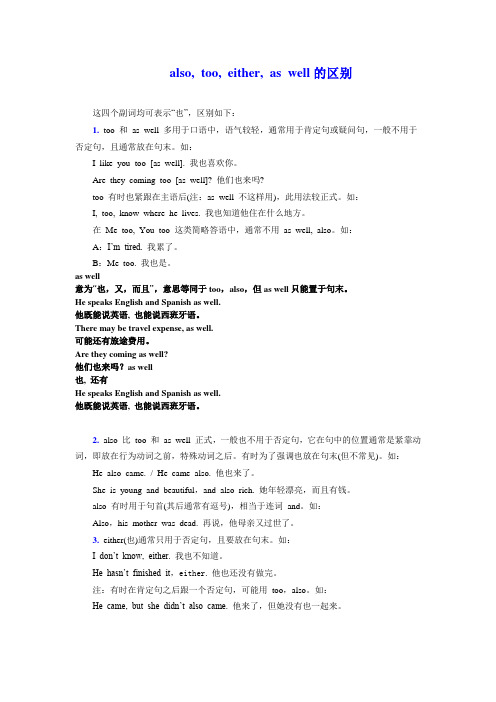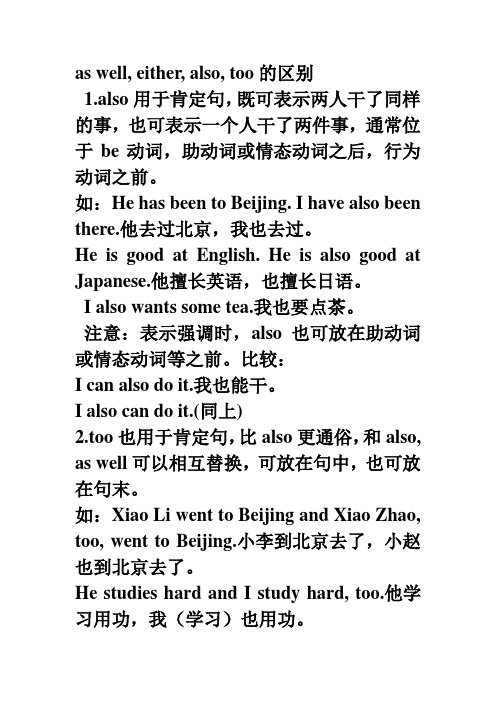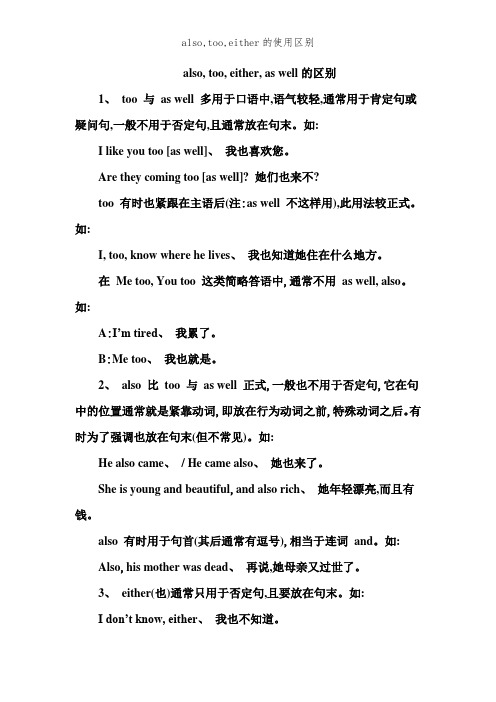too和either的区别
- 格式:doc
- 大小:22.50 KB
- 文档页数:1

also too either as well的区别和用法(一)Also, Too, Either, As well的区别和用法1. Also•用法一:位于句首的also–用于强调一个陈述句,并提供额外的信息,相当于汉语中的“还有”–例如:Also, I will need your help with this project. •用法二:位于句中的also–用于强调句中的某个词或短语,强调方式更为突出–例如:I love hiking, and also swimming.•用法三:位于句尾的also–用于加强某个陈述句,并给出相似的事实–例如:She loves reading, also.2. Too•用法一:位于句尾的too–用于表示与前面陈述相同的情况或意见,相当于汉语中“也是”–例如:I am tired, too.•用法二:位于句中的too–用于强调句中某人或某物和其他人或物一样–例如:He, too, has a dog.3. Either•用法一:位于句尾的either–用于在否定句中表示两种选择中的任何一种–例如:I don’t like tea, either.•用法二:either…or…–用于表示两种选择之间的关系,相当于汉语中的“要么…要么…”–例如:You can either study or play games.4. As well•用法一:位于句尾的as well–用于表示除了前面提到的情况之外,还有另外一项–例如:I like cooking and gardening as well.•用法二:as well as–用于列举一系列事物时,表示“还有…以及…”–例如:He is good at playing soccer as well asbasketball.以上是also, too, either, as well的常见用法及区别。
通过合理运用这些词语,可以使你的表达更加准确明确。

either和or和also和too区别造句子
1、too,either一般放句尾,also不能用于句尾,有时用于句首。
too多用于口语中,语气较轻,通常用于肯定句或疑问句,一般不用于否定句,且通常放在句末.如:
I like you too.我也喜欢你。
Are they coming too?他们也来吗?
also 有时用于句首(其后通常有逗号),相当于连词and.如:
Also,his mother was dead.再说,他母亲又过世了。
2、too可放主语后,also,either不行。
too 有时也紧跟在主语后,此用法较正式.如:
I,too,know where he lives.我也知道他住在什么地方。
注意:在Me too,You too这类简略答语中,通常不用either或also.如:A:I’m tired.我累了.
B:Me too.我也是.
3、either通常用于否定句,also 比too 正式,一般也不用于否定句,它在句中的位置通常是紧靠动词,即放在行为动词之前,特殊动词之后。
有时为了强调也放在句末(但不常见)如:
He also came./ He came also.他也来了。
She is young and beautiful,and also rich.她年轻漂亮,而且有钱。

also, too, either, as well的区别这四个副词均可表示“也”,区别如下:1.too 和as well 多用于口语中,语气较轻,通常用于肯定句或疑问句,一般不用于否定句,且通常放在句末。
如:I like you too [as well]. 我也喜欢你。
Are they coming too [as well]? 他们也来吗?too 有时也紧跟在主语后(注:as well 不这样用),此用法较正式。
如:I, too, know where he lives. 我也知道他住在什么地方。
在Me too, You too 这类简略答语中,通常不用as well, also。
如:A:I’m tired. 我累了。
B:Me too. 我也是。
as well意为“也,又,而且”,意思等同于too,also,但as well只能置于句末。
He speaks English and Spanish as well.他既能说英语, 也能说西班牙语。
There may be travel expense, as well.可能还有旅途费用。
Are they coming as well?他们也来吗?as well也, 还有He speaks English and Spanish as well.他既能说英语, 也能说西班牙语。
2.also 比too 和as well 正式,一般也不用于否定句,它在句中的位置通常是紧靠动词,即放在行为动词之前,特殊动词之后。
有时为了强调也放在句末(但不常见)。
如:He also came. / He came also. 他也来了。
She is young and beautiful,and also rich. 她年轻漂亮,而且有钱。
also 有时用于句首(其后通常有逗号),相当于连词and。
如:Also,his mother was dead. 再说,他母亲又过世了。

as well, either, also, too的区别1.also用于肯定句,既可表示两人干了同样的事,也可表示一个人干了两件事,通常位于be动词,助动词或情态动词之后,行为动词之前。
如:He has been to Beijing. I have also been there.他去过北京,我也去过。
He is good at English. He is also good at Japanese.他擅长英语,也擅长日语。
I also wants some tea.我也要点茶。
注意:表示强调时,also也可放在助动词或情态动词等之前。
比较:I can also do it.我也能干。
I also can do it.(同上)2.too也用于肯定句,比also更通俗,和also, as well可以相互替换,可放在句中,也可放在句末。
如:Xiao Li went to Beijing and Xiao Zhao, too, went to Beijing.小李到北京去了,小赵也到北京去了。
He studies hard and I study hard, too.他学习用功,我(学习)也用功。
3.either用于否定句,而且只能放在句末。
如:He didn’t know it. I didn’t know it either.他不知道那件事,我也不知道。
I can’t speak French and can’t write it, either.我不会讲法语,也不会写法语。
4.as well在口语中用得很多,用法和too完全一样,可以互换,通常位于句末。
如:She not only sings, she plays the piano as well.她不但会唱歌,而且会弹钢琴。
I can do it as well.这事我也能做。

"Still"、"also"、"too"、"yet"和"either"都是表示程度、范围、时间、条件等方面的副词,但它们的用法和意义有所不同。
1. "Still"表示持续的状态或程度,通常用于强调某种情况或状态的持续性,如:- She's still working on the project.(她仍在继续这个项目。
)- He's still not feeling well.(他仍然感觉不舒服。
)2. "Also"表示与前面的内容有关,但不是唯一的,通常用于列举或补充前面的内容,如:- I like swimming, also hiking and biking.(我喜欢游泳,也喜欢徒步旅行和骑自行车。
)- She's also a talented singer.(她也是一位有才华的歌手。
)3. "Too"表示某种情况或状态也适用于前面的人或物,通常用于加强前面的陈述,如:- I'm too tired to go out tonight.(我太累了,今晚不能出去了。
)- She's too busy to come to the party.(她太忙了,无法来参加聚会。
)4. "Yet"表示某种情况或状态还没有发生,通常用于否定句中,表示某种期待或希望,如:- I haven't seen him yet, but I'm sure he'll come.(我还没见到他,但我相信他会来的。
)- She's been studying hard, yet she still hasn't passed the test.(她一直在努力学习,但还没有通过考试。

also, too, either, as well的区别1、too 与as well 多用于口语中,语气较轻,通常用于肯定句或疑问句,一般不用于否定句,且通常放在句末。
如:I like you too [as well]、我也喜欢您。
Are they coming too [as well]? 她们也来不?too 有时也紧跟在主语后(注:as well 不这样用),此用法较正式。
如:I, too, know where he lives、我也知道她住在什么地方。
在Me too, You too 这类简略答语中,通常不用as well, also。
如:A:I’m tired、我累了。
B:Me too、我也就是。
2、also 比too 与as well 正式,一般也不用于否定句,它在句中的位置通常就是紧靠动词,即放在行为动词之前,特殊动词之后。
有时为了强调也放在句末(但不常见)。
如:He also came、/ He came also、她也来了。
She is young and beautiful,and also rich、她年轻漂亮,而且有钱。
also 有时用于句首(其后通常有逗号),相当于连词and。
如:Also,his mother was dead、再说,她母亲又过世了。
3、either(也)通常只用于否定句,且要放在句末。
如:I don’t know, either、我也不知道。
He hasn’t finished it,either、她也还没有做完。
注:有时在肯定句之后跟一个否定句,可能用too,also。
如:He came, but she didn’t also came、她来了,但她没有也一起来。
He went to Washington, but not to New York too、她去了华盛顿,但并不就是也去了纽约。
比较:He didn’t buy a computer, and she didn’t either、她没有买电脑,她也没有买。
英语辨析too有:
1.表示“也”:当“too”表示“也”时,通常用于肯定句句末,表示前
面提到的情况也适用于另一个人或物。
例如:
1.I like coffee. He likes coffee, too. (我喜欢咖啡。
他也喜欢咖啡。
)
2.表示“非常”:“too”还可以用来强调程度,表示“非常”或“过于”。
例如:
1.The book is too difficult for me. (这本书对我来说太难了。
)
3.与其他词的区别:
1.also:通常用于句中,表示“也”,与“too”意思相近,但用法不同。
例如:He also likes coffee. (他也喜欢咖啡。
)
2.either:用于否定句句末,表示“也”。
例如:I don't like coffee. He doesn't like coffee, either. (我不喜欢咖啡。
他也不喜欢咖啡。
)
3.as well:也用于肯定句句末,表示“也”,与“too”意思相近,但语气较为轻松。
例如:I like coffee. He likes coffee as well. (我喜欢咖啡。
他也喜欢咖啡。
)。
tooeitheralso的用法和区别
either,too,also的区别为:指代不同、语法不同、侧重点不同。
一、指代不同
1、either:(用于否定词组后)也。
2、too:(用于形容词和副词前)也。
3、also:此外;也。
二、语法不同
1、either:either作代词时,意为“(二者之中)任何一个”,在句中作主语或宾语,表示单数概念; 作主语时谓语动词一般用单数形式,但在否定句中常用复数形式。
2、too:too的基本意思是“也”“还”“而且”,用于肯定句,否定句用either。
3、also:also是较正式的用词,多用于书面语,基本意思是“也”“还”,表示两件事的性质相近或两件事情发生的时间相同,也可表示刚说过的话也适用于另一个人或物。
三、侧重点不同
1、either:either用于否定句,放在句末,之前加逗号。
2、too:too语气较轻,多用于口语,在肯定句中使用,通常位于句末。
3、also:also比too正式一些,语气较重,只用于肯定句,一般紧靠动词。
英语语法解析Also , Either , Too , As well的用法及区别1.also用于肯定句:Eg:You study English and I also study it.你学英语,我也学。
2.either用于否定句,并放在句尾:Eg:You don't study English and I don't study it either.你不学英语,我也不学。
3.too和as well 用于肯定句,放在句尾,多用于口语:Eg:You are a student and I am a student, too.你是学生,我也是。
You know the way and I know it as well.你知道路,我也知道。
#二.too和as well在口语中的使用频率要大于also,在also , too 和as well三者之中,also是比较正式的,书面语中比较多见。
而too和as well比较口语化一些。
否定句的时候,我们一般会使用either 放在句尾表示“也”,而不是使用too和also 。
Eg :1.Can you come too/as well?你也能来吗?2.I was soo busy I missed lunch and dinner as well.我太忙了以至于我忘记了吃午饭也忘记了吃晚饭。
3.I don't like grammar.我不喜欢语法。
4.I don't like it either.我也不喜欢。
#三.Also的用法1.also 比too 和as well 正式,一般也不用于否定句:Eg:She is young and beautiful, and also rich.她年轻漂亮,而且有钱.2.also 有时用于句首(其后通常有逗号),相当于连词and:Eg:Also, his mother was dead.再说,他母亲又过世了.3.我们经常把also 前置,来强调后面的观点:Eg:It’s very humid. Also, you can easily get sunburn.非常潮湿。
either,too,also,so这四个词都是副词,都含有 也的意思,可是它们的具体含义和用法却有比较明显的区别。
只能用在否定句中,常常和否定词not连用,用来否定词组或句子,其含义表示 也不 ,在一般情况下只能放在句末来加强整个句子的语气。
例如: She isn t likely to agree,either.她也不会同意的。
won t be in and won t (be) either.格林先生不在,史密斯先生也不在.表示 也 还 而且 ,常表示与某人做同样的事,也常用于非正式语体或口语中。
too通常放在句末或单词、词组之后,其语气较轻。
在句子中,too用作插入语时,前后应用逗号隔开,此时too与also可以替换。
too放在句末,表示强调谓语或宾语,当too放在形容词、副词之前,其含义表示 太 过于 ,too的用法比also更多些。
如: He can sing and dance, too.他会唱歌,也会跳舞。
That skirt is abit too short forher daughter.那条裙子对她女儿而言是太短了点儿。
You,too,may have a try.你也可以试一试。
Too the children will find in the book a lot of interesting pictures. 孩子们还能在书里面看到许多有趣的图片。
They also work in the hospital.=They work in the hospital,too.他们也在医院工作.3.在书面语里,also比too较为正式,also的语气较强,它的含义是 而且......还表示 此外还 也等含义,有时 also也表示 同样地的含义。
在口语中,also可以和too替换使用,但是,要注意also和too在句子中的位置不同。
also和常用的副词在句子中的位置相同,一般放在实意动词之前或系动词之后,有时放在整个谓语动词之前,有时也放在句首或句末用来修饰整个句子。
1).either用在否定句中,必须放在句末。
either本身不含有否定意义。
试译:
他没有来,他弟弟也没有来。
误:He didn’t come,his brother either.
正:He didn’t come,his brother didn’t ,either.
巧记either,also和too的用法
either,also和too,都是汉语“也、还”意。
be also,also do;句中位置记清楚。
also语气比too重,都是用来表肯定。
主谓之间加too字,too字两边有逗号。
either用于否定句,固定位置在句尾。
2).also一般来说,是比较正式的用语,它经常放在句中,其位置在行为动词之前,动词to be之后。
如有助动词或情态动词,一般放在助动词或情态动词之后。
例如:
He also works in that factory. 他也在那家工厂工作。
I can also tell you a story.我也能给你讲个故事。
3).too一般用在肯定句中,放在句末,或作为插入语放在句中。
例如:
She, too,is a singer.她也是一位歌唱家。